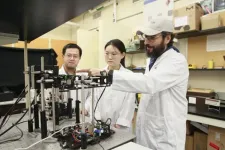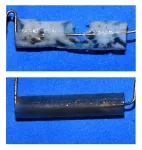(Press-News.org) When it comes to having surgery, older adults don’t just base their decision on how much pain they’ll feel and how quickly they’ll recover, a new study finds.
Many also have serious concerns about how much they’ll have to pay out of their own pockets, how much work they’ll miss, and whether they’ll catch COVID-19 in the hospital or surgery center.
And a majority of those who called themselves very concerned about these issues ended up not having an operation that they had considered having, the study finds. The percentage who didn’t go through with surgery was much lower among those who said they’d been very concerned about pain or the recovery process.
The new data, published in JAMA Network Open by a team from the University of Michigan Institute for Healthcare Policy and Innovation, could inform policymakers, surgical teams and employers.
The findings come from a further analysis of data from the National Poll on Healthy Aging, which in 2022 showed that nearly half of older adults who had considered surgery had concerns about costs, time off from work or COVID risk. IHPI runs the poll, with funding from AARP and Michigan Medicine, U-M’s academic medical center.
Surgeon Nicholas Berlin, M.D., M.P.H., M.S., said the new findings have influenced his own interactions with patients.
“When I counsel patients in my clinic who are considering elective surgery, I now also spend a good deal of time discussing the financial and employment implications of surgery with them,” he said. “Unfortunately, I have seen a number of insured patients forego needed surgery because they are unable to afford the out-of-pocket costs or take time away from work for recovery.”
Cost considerations
The new study shows that nearly half of those who said they were very concerned about cost, and more than half of those who were very concerned about taking time off work, ended up not having an operation they had considered.
By contrast, those who said they’d been very concerned about surgery-related pain were just as likely as those with no concerns about pain to have gone ahead with the operation.
He notes that federal policymakers have tried to address this issue by requiring hospitals to make prices for operations more transparent and reduce “surprise” billing for services by providers who don’t take part in a patient’s insurance network.
But, he adds, these policies don’t address financial concerns about losing wages from employment that doesn’t come with paid time off, or costs related to the way a person’s health insurance is structured. In the past two decades, the percentage of people over 60 who work has doubled, and enrollment in Medicare Advantage plans with limited networks, and in high deductible health plans, has grown.
Berlin is a fellow in microsurgery and plastic surgery at the U-M Medical School’s Department of Surgery, and an alumnus of the National Clinician Scholars Program at IHPI.
COVID-19 considerations
The COVID-19 concerns found in the study reflect the fact that the original poll was conducted in August 2021 and asked respondents to reflect on surgery-related concerns and decisions in the previous five years.
At the time, two-thirds of those who said they were very concerned about COVID-19 exposure in the surgery and recovery process ended up not having an operation they had considered.
At the start of the pandemic in early 2020, elective operations like the ones asked about in the poll were canceled for months, and only emergency operations proceeded. That led to ripple effects on surgery scheduling after elective operations resumed.
Even today, for patients who are especially vulnerable to severe COVID-19, or cautious about it, the recent surge in COVID-19 cases and rolling back of infection-prevention requirements by hospitals and surgery centers may affect decision-making, Berlin said.
Poll director and senior author of the new paper Jeffrey Kullgren, M.D., M.S., M.P.H, say more research is needed to understand what influences a person’s decision to proceed with operations so that health care providers can best counsel their patients. Kullgren is a primary care physician at the VA Ann Arbor Healthcare System and associate professor of internal medicine at U-M, and a member of IHPI and the VA Center for Clinical Management Research.
The most common elective operations considered by poll respondents were hip or knee replacement, cataract surgery, hernia repair, gall bladder removal and hysterectomy, all of which can be medically necessary and covered by insurance. But some respondents also had considered or had cosmetic surgery, which is paid for entirely out of pocket.
“More research is needed to understand and address caregiver impacts, which were also a factor in not having surgery for some people in the study,” said Kullgren. “This includes both those who are concerned about surgery temporarily making them unable to care for someone else, and those concerned about having someone to care for them after their operation.”
The poll involved 2,110 adults between the ages of 50 and 80, of whom 32% said they had considered having an elective operation in the previous five years. Two-thirds of those who said they’d considered having an operation actually had the operation.
For more about the NPHA’s methodology, visit https://www.healthyagingpoll.org/survey-methods
In addition to Berlin and Kullgren, the study’s authors are NPHA poll team members Matthias Kirch, M.S., Dianne Singer, M.P.H., Erica Solway, Ph.D., and Preeti Malani, M.D.
Preoperative Concerns of Older Adults and Decisions About Elective Surgery, JAMA Network Open, doi:10.1001/jamanetworkopen.2023.53857
END
Worries about costs, time off work and COVID-19 kept some older adults from having surgery
Clinicians, employers and policymakers should be aware of impacts of out-of-pocket costs, paid time off and infection control practices, U-M team suggests
2024-01-30
ELSE PRESS RELEASES FROM THIS DATE:
JMIR Perioperative Medicine invites submissions on perioperative blood management
2024-01-30
JMIR Publications is pleased to announce a new theme issue titled “Perioperative Blood Management” in JMIR Perioperative Medicine. The premier, peer-reviewed journal is indexed in PubMed and focuses on how technology and data science can improve care delivery and surgical patient outcomes. The new theme issue aims to explore the latest advancements, challenges, and patient-centered innovative approaches in optimizing blood-related practices before, during, and after surgical procedures.
JMIR Perioperative Medicine welcomes contributions from global researchers, clinicians, and experts in ...
Structural color ink: Printable, non-iridescent and lightweight
2024-01-30
A new way of creating color uses the scattering of light of specific wavelengths around tiny, almost perfectly round silicon crystals. This Kobe University development enables non-fading structural colors that do not depend on the viewing angle and can be printed. The material has a low environmental and biological impact and can be applied extremely thinly, promising significant weight improvements over conventional paints.
An object has color when light of a specific wavelength is reflected. With traditional pigments, this happens by molecules absorbing other colors from white light, but over time this interaction makes the molecules degrade and the color fades. ...
A faster, more efficient imaging system for nanoparticles
2024-01-30
Teams led by professors Jinyang Liang and Fiorenzo Vetrone from the Énergie Matériaux Télécommunications Research Centre at the Institut national de la recherche scientifique (INRS) have developed a new system for imaging nanoparticles. It consists of a high-precision, short-wave infrared imaging technique capable of capturing the photoluminescence lifetimes of rare-earth doped nanoparticles in the micro- to millisecond range.
This groundbreaking discovery, which was published in the journal Advanced Science, paves the way for promising applications, particularly in the biomedical and information security fields.
Rare-earth ...
Lifetime of ‘biodegradable’ straws in the ocean is 8-20 months, study finds
2024-01-30
Plastic drinking straws that get into marine ecosystems make beaches unsightly and pose problems for turtles and seabirds. So, people increasingly favor alternatives marketed as biodegradable or compostable. But do marine microorganisms break apart those straws? Researchers conducted experiments with seawater and report in ACS Sustainable Chemistry & Engineering that some commercial bioplastic or paper straws might disintegrate within eight to 20 months in coastal ocean systems and switching to ...
Tomato juice’s antimicrobial properties can kill salmonella
2024-01-30
Washington, D.C.—Tomato juice can kill Salmonella Typhi and other bacteria that can harm people's digestive and urinary tract health, according to research published this week in Microbiology Spectrum, a journal of the American Society for Microbiology. Salmonella Typhi is a deadly human-specific pathogen that causes typhoid fever.
“Our main goal in this study was to find out if tomato and tomato juice can kill enteric pathogens, including Salmonella Typhi, and if so, what qualities they ...
Joint efforts to ensure the sustainability of our one and only Earth
2024-01-30
The 37th International Geological Congress (IGC 2024) in August 2024, Busan, Korea, will highlight a growing concern amid urgent threats posed by accelerated climate and environmental changes. This will prompt collaborative efforts towards ensuring the sustainability of our planet.
Abnormally high temperatures across the globe during the past year were expected to make 2023 the hottest year in Earth's history. This realization underscores the concept of climate change, which was once confined to academic desks but has since permeated into our daily existence.
Geologists now assert that the rapid climate and environmental changes necessitate ...
KIMM develops technology for detecting injection of medication to prevent medical accidents related to analgesic drug infusion pump in hospitals
2024-01-30
Excessive administration of analgesic drugs frequently results in medical accidents. To prevent the occurrence of these accidents, a drug infusion pump featuring a technology for safely detecting medication administration has been developed for the first time in the world.
The research team led by Senior Researcher Dong-kyu Lee of the Korea Institute of Machinery and Materials (President Seog-hyun Ryu, hereinafter referred to as KIMM), an institute under the jurisdiction of the Ministry of Science and ICT, has succeeded in developing the technology for customized sensor modules capable of measuring the extremely low flow rate of analgesic drug infusion pumps as well as the existence ...
Machine sentience and you: what happens when machine learning goes too far
2024-01-30
There’s always some truth in fiction, and now is about the time to get a step ahead of sci-fi dystopias and determine what the risk in machine sentience can be for humans.
Although people have long pondered the future of intelligent machinery, such questions have become all the more pressing with the rise of artificial intelligence (AI) and machine learningT. These machines resemble human interactions: they can help problem solve, create content, and even carry on conversations. For fans ...
Drexel researchers propose AI-guided system for robotic inspection of buildings, roads and bridges
2024-01-30
Our built environment is aging and failing faster than we can maintain it. Recent building collapses and structural failures of roads and bridges are indicators of a problem that’s likely to get worse, according to experts, because it’s just not possible to inspect every crack, creak and crumble to parse dangerous signs of failure from normal wear and tear. In hopes of playing catch-up, researchers in Drexel University’s College of Engineering are trying to give robotic assistants the tools to help inspectors with the job.
Augmenting visual ...
Residents of rural ‘glades’ take a ‘leap of faith’ to combat dementia
2024-01-30
The prevalence of Alzheimer’s disease and related dementias (ADRD) is disproportionately high among rural, racially/ethnically diverse older residents. In fact, they face up to an 80 percent greater risk of cognitive impairment in older age, and 2.5 times potentially preventable ADRD-related hospitalizations compared to urban dwellers. It is estimated that early and accurate diagnosis in the mild cognitive impairment stage could save up to $7 trillion in patients’ health and long-term care costs by 2050.
To address these health disparities in rural underserved populations, researchers from Florida ...
LAST 30 PRESS RELEASES:
Neighborhood factors may lead to increased COPD-related emergency department visits, hospitalizations
Food insecurity impacts employees’ productivity
Prenatal infection increases risk of heavy drinking later in life
‘The munchies’ are real and could benefit those with no appetite
FAU researchers discover novel bacteria in Florida’s stranded pygmy sperm whales
DEGU debuts with better AI predictions and explanations
‘Giant superatoms’ unlock a new toolbox for quantum computers
Jeonbuk National University researchers explore metal oxide electrodes as a new frontier in electrochemical microplastic detection
Cannabis: What is the profile of adults at low risk of dependence?
Medical and materials innovations of two women engineers recognized by Sony and Nature
Blood test “clocks” predict when Alzheimer’s symptoms will start
Second pregnancy uniquely alters the female brain
Study shows low-field MRI is feasible for breast screening
Nanodevice produces continuous electricity from evaporation
Call me invasive: New evidence confirms the status of the giant Asian mantis in Europe
Scientists discover a key mechanism regulating how oxytocin is released in the mouse brain
Public and patient involvement in research is a balancing act of power
Scientists discover “bacterial constipation,” a new disease caused by gut-drying bacteria
DGIST identifies “magic blueprint” for converting carbon dioxide into resources through atom-level catalyst design
COVID-19 vaccination during pregnancy may help prevent preeclampsia
Menopausal hormone therapy not linked to increased risk of death
Chronic shortage of family doctors in England, reveals BMJ analysis
Booster jabs reduce the risks of COVID-19 deaths, study finds
Screening increases survival rate for stage IV breast cancer by 60%
ACC announces inaugural fellow for the Thad and Gerry Waites Rural Cardiovascular Research Fellowship
University of Oklahoma researchers develop durable hybrid materials for faster radiation detection
Medicaid disenrollment spikes at age 19, study finds
Turning agricultural waste into advanced materials: Review highlights how torrefaction could power a sustainable carbon future
New study warns emerging pollutants in livestock and aquaculture waste may threaten ecosystems and public health
Integrated rice–aquatic farming systems may hold the key to smarter nitrogen use and lower agricultural emissions
[Press-News.org] Worries about costs, time off work and COVID-19 kept some older adults from having surgeryClinicians, employers and policymakers should be aware of impacts of out-of-pocket costs, paid time off and infection control practices, U-M team suggests






